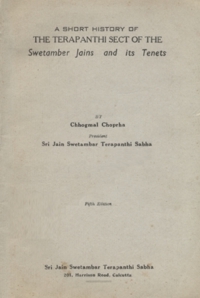-
We have dealt in brief with the main principles of Jainism, but we have not so far dealt with the question of what Jainism has to say regarding God, whether He is the creator or otherwise. That would be going into a controversial question. To answer the question in brief, Jainism does not think of God as the Creator. That would be attributing to Him qualities which least befit Him. Jain idea of Godhood is the perfected soul, the liberated soul (siddha and mukta). Every soul has latent Godship in him. It is the karma particles that wrap up its inherent qualifications and make it roam about in this world. To stop the inflow of Karmas to destroy the already accumulated karmas and to bring out all the best qualities of soul is the supreme need. There are eight kinds of karma and it is necessary to destroy all of them by good actions and by penances for past defections. It is not the scope of this article to describe them in detail. For an inquisitive person, we would refer him in general to the sacred literature of the Jains and to the Jain Sadhus in particular. Jains adore those only as their God, who have destroyed all Karmas and have attained salvation, they accept those as their preceptors who have given up all worldly connections and have controlled selfish desires and who lead the life of true Sadhus and they follow that only as the universal and true religion which is promulgated by such God and preceptor.
-
Jainism is a religion, which teaches us to treat all sentient beings as inherently equal. It enjoins consideration for the feelings of all beings. It thus preaches not only universal brotherhood of human beings alone, but of all sentient beings. It aims at the uplift of the soul and for that purpose enjoins on all its followers to exercise the greatest self-control. It strongly deprecates the action of those who for their own selfish ends hurt the feelings of others. To treat others in the same way as one's own self is its principal teaching and once this fact is realised, all other questions are easily solved. The universal truths or principles of religion as preached by Jainism are non-injury to others, non-speaking of falsehood, non-stealing, non-indulgence in sexual matters and restriction of possession and they are all recognised by all schools of thought as sound principles and whoever practises them, develops his character. There is no caste or creed race or nation who cannot follow these principles of Jainism. Anyone following any profession may strive to become a Jain or follow the principles leading to the ultimate goal. All outward manifestations of inequality in this world owe their origin to various karma forces but that does not in any way interfere with the practice of the true principles. Equality all beings, fraternity with the whole world and liberation of every soul are the watchwords of Jainism, and must also be the watchwords of every other faith having the uplift of this world as its aim. It has been truly said.
जो सहस्स सहस्सानं संगामे दुज्जए जिए
एगं णिणेज्ज अप्पाण्णं एससे परमो जओOne may conquer a million persons in war but he who conquers self is the greatest conqueror.
Therefore let every one strive to practise religion, while it is not too late.जराजाव न पोडई वही जाव न बद्दइ
जाविन्दिया न हायंति ताव धम्मं समायरेSo long old age and diseases do not overcome you. so long as your senses are not impaired, go on practising religion.
-
Jains hold that their religion as promulgated by omniscient sages is perfect. But Jain religion enjoins that not one of its principles is to be forced upon any one. The heart is to be converted by reasoning only. Religion is to be practised by one's own self, by his own personal exertions, not through agents or substitutes. It is by the restraint of body, mind and speech that religion can be practised. It is the preaching of the evil effects of wrongful acts and persuading people to give them up which is really commendable and religious. No force and allurement will make one change one's heart. So long as you do not touch the heart of the evil-door, you cannot by force make him give up his evil desires.
END OF BOOK
A Short History Of The Terapanthi Sect Of The Swetamber Jains And Its Tenets: 5.5 The Tenets Explained [22-24]
Author:
 Chhogmal Choprha
Chhogmal Choprha
 Chhogmal Choprha
Chhogmal Choprha
Published: 30.09.2010
Updated: 02.07.2015
Updated: 02.07.2015
Sources
5th Edition, 1946
Publisher:
Sri Jain Swetambar Terapanthi Sabha, Calcutta, India

Publisher:
Sri Jain Swetambar Terapanthi Sabha, Calcutta, India

Page statistics
This page has been viewed 1417 times.